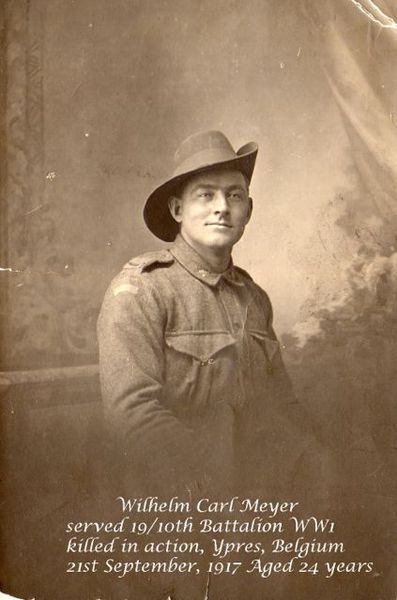Pte
William Carl Meyer
Information about birth
|
Date of birth: 07/03/1894 |
|
Place of birth: Bright, South Australia, Australia |
General information
|
Last known residence: Hilltown, Clare, Sout Australia, Australia |
|
Profession: Farmer |
|
Religion: Methodist |
Army information
|
Country: Australia |
|
Force: Australian Imperial Force |
|
Rank: Private |
|
Service number: 5798 |
|
Enlistment date: 28/03/1916 |
|
Enlistment place: Kadina, South Australia, Australia |
|
Units: — Australian Infantry, 10th Bn. (Last known unit) |
Information about death
|
Date of death: 21/09/1917 |
|
Place of death: Polygon Wood, Zonnebeke, Belgium |
|
Cause of death: Killed in action (K.I.A.) |
|
Age: 23 |
Cemetery
|
Tyne Cot Cemetery Plot: XLI Row: A Grave: 21 |
Points of interest 4
| #1 | Place of birth | ||
| #2 | Last known residence | ||
| #3 | Enlistment place | ||
| #4 | Place of death (approximate) |
My story
William Carl Meyer was the son of Louise Christianna and Johann Heinrich Friedrich Meyer. He was born on 7 March 1894 in Hilltown, South Australia. Before the war, he worked as a farmer. In March 1916, William enlisted in the Australian Army. He was part of the 10th Battalion (3rd Brigade, 1st Division).
William was killed on 21 September 1917 at the Battle of the Menin Road Ridge, part of the Battle of Passchendaele. The first objective was to take the Nonnebossen. Then they would advance as far as the Polygoneveld on the edge of Polygon Wood. Finally, they wanted to push through to the middle of Polygon Wood, just before the former racecourse. The 10th Battalion, to which William belonged, was to take that last objective. On 21 September, the area between the second and third objectives and also the old front line came under heavy fire.
William died at the age of 24 and was originally buried in Polygon Forest. After the war, he was reburied in Tyne Cot Cemetery, where he found his final resting place.
William was killed on 21 September 1917 at the Battle of the Menin Road Ridge, part of the Battle of Passchendaele. The first objective was to take the Nonnebossen. Then they would advance as far as the Polygoneveld on the edge of Polygon Wood. Finally, they wanted to push through to the middle of Polygon Wood, just before the former racecourse. The 10th Battalion, to which William belonged, was to take that last objective. On 21 September, the area between the second and third objectives and also the old front line came under heavy fire.
William died at the age of 24 and was originally buried in Polygon Forest. After the war, he was reburied in Tyne Cot Cemetery, where he found his final resting place.
Sources 6
|
10th Australian Infantry Battalion, (Australian War Memorial, Campbell (AWM), AWM4 23/27/23). https://www.awm.gov.au/ Sources used |
|
Australian Red Cross Wounded and Missing Enquiry Bureau (Australian War Memorial, Campbell (AWM), RCDIG1052313). http://www.awm.gov.au Sources used |
|
First Australian Imperial Force Personnel Dossiers, 1914-1920, (National Archives of Australia, Canberra (NAA), B2455, MEYER W C). https://recordsearch.naa.gov.au/SearchNRetrieve/Interface/SessionTimeout.aspx Sources used |
|
Lock CBL., The Fighting 10th : souvenir of the 10th Battalion AIF 1914-1919, (Adelaide, South Australia, Webb & Son, 1936), pg. 70. Sources used |
|
Roll of Honour Cards, 1914-18 War (Australian War Memorial, Campbell (AWM), AWM131). https://www.awm.gov.au/ Sources used |
|
Unit embarkation nominal rolls, 1914-18 War (Australian War Memorial, Campbell (AWM), AWM8). https://www.awm.gov.au/ Sources used |
More information 4
|
Commonwealth War Graves Commission Database https://www.cwgc.org/find-records/find-war-dead/casualty-details/463943 |
|
Namenlijst (In Flanders Fields Museum) https://namenlijst.org/publicsearch/#/person/_id=f5d1bd27-c239-4d3e-a225-d488b489e040 |
|
Lives of the First World War (Imperial War Museum) https://livesofthefirstworldwar.iwm.org.uk/lifestory/7545324 |
|
The AIF Project (UNSW Canberra) https://aif.adfa.edu.au/showPerson?pid=207296 |
